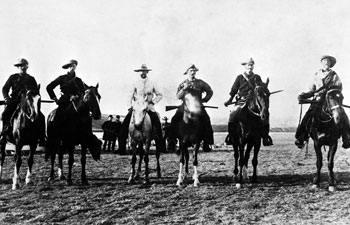August 30, 2013
… a square shooter, endowed with an abundance of human kindness, always charming, courteous and hard working.
 After graduating from Kings College in Windsor, Nova Scotia, Dr. deVeber began his medical studies at Harvard. Owing to a “slight difference of opinion between him and the faculty,” he only stayed for one year. He then transferred to St. Bartholomew’s Medical School in London, where he graduated with his medical diploma in 1869.
After graduating from Kings College in Windsor, Nova Scotia, Dr. deVeber began his medical studies at Harvard. Owing to a “slight difference of opinion between him and the faculty,” he only stayed for one year. He then transferred to St. Bartholomew’s Medical School in London, where he graduated with his medical diploma in 1869.
Regimental surgeon in the Rocky Mountain Rangers
He spent the first decade of his career in New Brunswick. A gifted athlete, his interest in horses and outdoor adventure probably led him to join the North West Mounted Police (NWMP) as a 33-year-old in 1882. That May, he reported to Staff Sergeant Sam Steele in Winnipeg.
For his first posting as a hospital sergeant, he traveled up the Assiniboine by paddle steamer to Fort Ellice and then over land to Fort Qu’Appelle. He eventually became responsible for the NWMP hospital care at Fort Calgary.
With the outbreak of North West Rebellion in 1885, Dr. deVeber joined the Rocky Mountain Rangers as the regimental surgeon. He and his group patrolled the plains east of Medicine Hat as far south as the Cypress Hills. They were also responsible for protecting the Foothills ranches and settlements, the telegraph line from Medicine Hat to Fort MacLeod and the construction crews on the railway from Lethbridge to near Medicine Hat.
Life in private practice
After the Rangers disbanded in July 1885, he became the first physician in the Northwest Territories to enter private practice.
The next year, Dr. deVeber made a 130-mile (210-km) house call to from Fort McLeod to Cochrane, riding on five horses in the process. He diagnosed the patient with typhoid fever. At the time, the treatment for typhoid was to give large doses of Quinine. He didn’t have any. His only available treatment was the brandy in his pouch, which she declined - “the only teetotaler whose opinion pleased him.”
One patient rode 70 miles (120 km) to see him and was “cured” when Dr deVeber gave him three large bottles of differently colored liquids for his gastritis.
Political life
 Elected to the NWT Legislative Assembly in 1898, he helped draft the first Sanitation Act. After later being elected in Alberta’s first election he was appointed to Rutherford’s cabinet (1905) as the Minister without Portfolio. However, before the first cabinet meeting, he was elevated by Prime Minister Laurier to the Senate where he remained until 1925.
Elected to the NWT Legislative Assembly in 1898, he helped draft the first Sanitation Act. After later being elected in Alberta’s first election he was appointed to Rutherford’s cabinet (1905) as the Minister without Portfolio. However, before the first cabinet meeting, he was elevated by Prime Minister Laurier to the Senate where he remained until 1925.
He is one of six Alberta Senators after whom a mountain has been named (a prominent peak west of Grande Cache).
Dr. deVeber forbade his two sons to enter medicine, but two grandsons and two great-granddaughters all became medical specialists.
